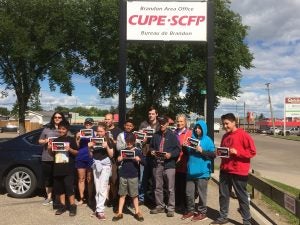Private Public Partnerships – Stay Informed
We are not opposed to a new school, we are as excited as you are! But we must stand together and oppose the building process. Public-Private Partnerships are not the way to go. Please visit our site periodically to check out the news stories. We will be posting information for you periodically.
September 21st 2017: The following letter was submitted to Letters to the Editor in The Brandon Sun:

Thank you to all of you who have helped us deliver the pamphlets!
We really appreciated your help.

Strike Vote Demystified
Strike Vote Demystified
Wait for it… I’m loading…
Workers Compensation and WS&H
CUPE 737 would like to provide you with the link to the Workers Compensation Board Manitoba. Please visit the site for up to date, accurate information for any questions or concerns you may have.
Also, please be aware of the Health & Safety information that is provided for all staff on the Brandon School Division Intranet Portal. You can find all the information you need under the Groups Tab.
Please be sure to document! You never know what you’d need… doesn’t hurt to right it down.

Union Lingo… what are they talking about?
Ever wonder what some of the terms mean that are used in meetings or that are found in your Collective Agreement? We would like to help you! Here are some commonly used terminology for your convenience.
Arbitration: Method of settling disputes through the intervention of a third party whose decision is final and binding. Such a third party can be one person or else a board with a chairman and one or more representatives. (The arbitration process is often the last step in settling grievances and, in cases where the law prevents certain workers from taking strike action, can be used as the final stage of collective bargaining.)
Bargaining Agent: Union designated by a labour relations board or similar government agency as the exclusive representative of all employees in a bargaining unit for the purpose of collective bargaining.
Bargaining Unit: Group of workers in a craft, department, plant, firm, industry or occupation determined by a labour relations board or a similar body as appropriate for representation by a union for purposes of collective bargaining.
Base Rate: The lowest rate of pay, expressed in hourly arms, for the lowest paid qualified worker classification in the bargaining unit. Not to be confused with basic rate, which is the straight-time rate of pay per hour, job or unit, excluding premium, incentive bonuses, etc.
Certification: Official designation by a labour relations board or similar government agency of a union as sole and exclusive bargaining agent, following proof of majority support among employees in a bargaining unit.
Collective Agreement: A contract (agreement and contract are used interchangeably) between one or more unions acting as bargaining agent, and one or more employers, veering wages, hours, working conditions, fringe benefits, rights of workers and unions, and procedures to be followed in settling disputes and grievances.
Collective Bargaining: method of determining wages, hours and other conditions of employment through direct negotiations between the union and employer. Normally the result of collective bargaining is a written contract which covers all employees in the bargaining unit, both union members and non-union members.
Conciliation and Mediation: A process which attempts to resolve labour disputes by compromise or voluntary agreement. Decisions by a mediator, conciliator or conciliation board are not binding and the parties are free to accept or reject recommendation. The conciliator is often a government official while the mediator is usually a private individual appointed as a last resort, sometimes even after the start of a strike.
Contract Proposals: Proposed changes to the Collective Agreement put forward by the union or the employer and subject to collective bargaining.
Grievance: Complaint against management by one or more employees, or a union, concerning an alleged breach of the Collective Agreement or an alleged injustice. Procedure for the handling of grievances is usually defined in the agreement. The last step is usually arbitration.
Labour Relations Board: A board established under provincial or federal labour relations legislation to administer labour law, including certification of trade unions as bargaining agents, investigation of unfair labour practices and other functions prescribed under the legislation.
Local: Also known in some unions as lodge or branch. It is the basic unit of union organization. Trade unions are usually divided into a number of locals for the purposes of local administration. Those locals have their own officers. They are usually responsible for the negotiation and day-to-day administration of the Collective Agreement covering their members.
Seniority: Terms used to designate an employee’s status relative to other employees, for determining order of layoff, promotion, recall, transfer, vacations, etc. Depending on the provisions of the Collective Agreement, seniority can be based on length of service alone or on additional factors such as ability or union duties.
Shop Steward: A union official who represents a specific group of members and the union in union duties, grievance matters, and other employment conditions. Stewards are usually part of the work force they represent.
Strike: A cessation of work by employees in combination with a common understanding for the purpose of compelling an employer to agree to terms or conditions of employment. Usually the last stage of collective bargaining when all other means have failed. Except in special cases, strikes are legal when a Collective Agreement is not in force. A rotating strike is a strike organized in such a way that only some of the employees stop work at any given time, each group taking its turn. A sympathy strike is a strike by workers not directly involved in a labour dispute – an attempt to show labour solidarity and bring pressure on an employer in a labour dispute. A wildcat strike is a strike violating the Collective Agreement and usually not authorized by the union.
Strikebreaker; Scab: A person who continues to work or accepts employment to replace workers who are on strike. By filling their jobs, the strikebreaker may weaken or break the strike.
Strike Vote: Vote conducted among members of a union to determine whether or not to go on strike.
Working Conditions: Conditions pertaining to the workers’ job environment, such as hours or work, safety, paid holidays and vacations, rest period, free clothing or uniforms, possibilities of advancement, etc. Many of these are included in the Collective Agreement and subject to Collective Bargaining.
Education
You can learn about various education opportunities that CUPE MB has to offer here. Click the link or the picture! For information about conferences click on the About tab while you’re there.
Scholarship
Welcome to our Scholarship page! Congratulations in your endeavour to pursue secondary education! A new information poster will be posted every year in April / May.
Wait for it – I’m loading!
Scholarship Application
Blue Cross Coverage
Have questions about Blue Cross? Click the link and select Customer E-Service on the right. Enter your information and all your questions will be answered!
Collective agreement
Here is our NEW Collective Agreement! the term for this agreement runs from July 1, 2014 to June 30, 2018. You can also view your Agreement on Employee Connect. Please log in to view it at least once, Human Resources would like you to indicate if you’d like a hard copy, or if you’d prefer to just view it online.
Wait for it – the PDF is loading.
You can download your agreement by clicking the pdf attachment under the viewer.
Expense Voucher & Scholarship Application
(wait for it… the pdf is loading!)
(wait for it… the pdf is loading!)
Save your completed Workload form and e-mail to your Union President, Jamie Rose.
jrosecupe737@outlook.com



